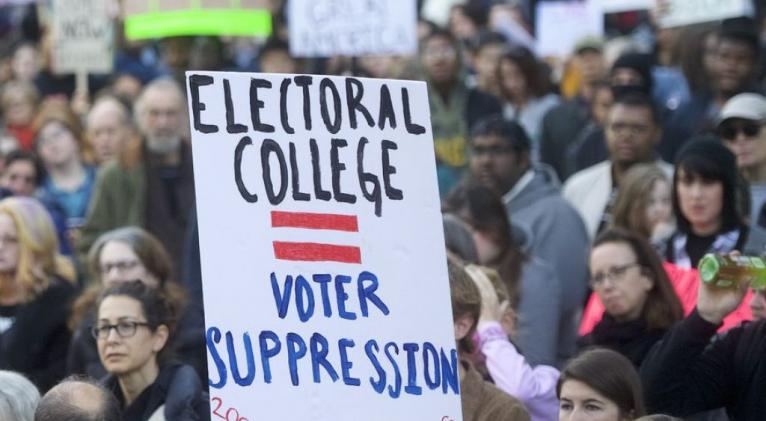Poll: most people who voted in 2016 want to abolish the Electoral College
especiales

Given that Hillary Clinton is currently beating Donald Trump by more than 2 million votes nationally, and that she’s the second Democratic candidate in recent memory to win the popular vote while losing the presidency, it’s hardly surprising that efforts to abolish the Electoral College have seen a jolt of energy since the election. Outgoing Sen. Barbara Boxer (D-CA) introduced a constitutional amendment to elect the president by popular vote, and the National Popular Vote Compact — a state-based attempt to abolish the Electoral College by allocating electoral votes to the popular vote winner — has gained momentum.
A recent poll by Civis Analytics, a Democratic data science and polling firm formed by veterans of the 2012 Obama campaign, suggests that an overwhelming majority of Americans who voted in the 2016 election want a change:
Civis posed the question to respondents this way: "Every four years, the US president is selected by the Electoral College, which awards votes depending on the number of states a candidate wins in the general election that year and the size of those states, not the total number of votes a candidate receives from voters across the country. In last week's election, more people voted for Democrat Hillary Clinton than Republican Donald Trump, but Trump won the election because he was awarded more votes by the Electoral College.”
“Which of the following comes closest to your view: We should select presidents based on whichever candidate gets the most votes; or We should select presidents based on votes awarded by the Electoral College."
The result was that a strong majority — 62 percent — picked the popular vote option.
The survey was conducted with a sample of 1,084 registered voters who reported voting in the 2016 election. The survey was conducted online on November 15 and 16, and responses were weighted to reflect the election result and Civis's best guess of what the 2016 electorate's demographic composition was. The margin of error is +/- 2.9 points.
Civis is a partisan firm, but it’s widely respected and its polling is regarded as high-quality. And the results match with earlier polling by Gallup, which found that 63 percent of adults in 2013 wanted to get rid of the Electoral College, and that a majority of Americans have wanted to abolish it every time they asked the question, going back to 1967.
Fascinatingly, Gallup found very little variation in support for a popular vote between Democrats, Republicans, and independents in 2013; back in 2000 and 2001, in the wake of Al Gore’s popular vote win and Electoral College loss, the breakdown was more partisan. Civis's results suggest that opinions on the Electoral College have already repolarized. While 87.5 percent of Clinton voters they asked support changing to a popular vote system, only 32.5 percent of Trump voters do.
Getting rid of the Electoral College is a heavy lift, politically. Even if done through an interstate compact, where states commit to allocate their electoral votes to the popular vote winner (provided enough other states do the same to swing the election), supporters would need to enlist big swing states like Florida, Pennsylvania, and Ohio, many of which have Republican governors and legislatures who’d likely block such an effort. But mass popular support for the change suggests a push isn’t totally hopeless. Indeed, it suggests that those states could join the compact and help abolish the Electoral College through passing ballot initiatives.














Add new comment